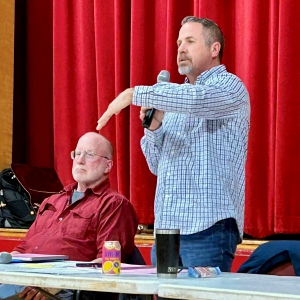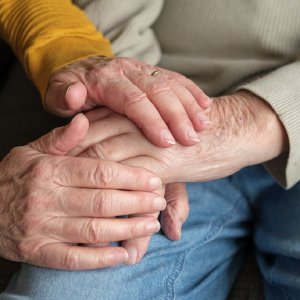Debra Marshall: The good old days of nursing
| Published: 07-31-2016 12:15 AM |
I was talking to a nurse the other day, and we got into a long discussion of “how it used to be.” I’m a Chinese medicine practitioner, and I was raised by a man who was, among other things, an EMT.
I spent a lot of time next door with his mother, my Nana, who was a nurse, so the long view of the treatment of ailments sort of runs in my blood. Nan, through no fault of her own, has been dead now for 30-odd years.
Nan was a great one for talking to herself. I’d often be upstairs in her attic reading her old children’s books when she got home from her shift at the hospital in the afternoon, and I’d hear her talking away downstairs, sometimes quite emphatically. Eventually I’d go downstairs.
“There’s no one here, Nan,” I’d say. “Who are you talking to?”
“Myself,” was the inevitable answer. “It’s the most intelligent conversation I’ve had all day.”
That, in case you don’t know any nurses, was commentary about the doctors she worked with.
Nan became a nurse soon after nursing became something you could go to school to learn. Back in the day, student nurses lived in housing on the hospital grounds, and had strict rules about what they could do during the little time off they were allowed.
Student nurses learned on the job – and they also cleaned the wards, cooked meals and did any other work required of them by the head nurse and the doctors who ruled the hospital like feudal lords.
Article continues after...
Yesterday's Most Read Articles
 ‘It’s everything’: In largest rally yet, Trump protestors descend on Concord
‘It’s everything’: In largest rally yet, Trump protestors descend on Concord
 Chichester reinstates most of town budget eliminated weeks ago
Chichester reinstates most of town budget eliminated weeks ago
 ‘There was no oversight’: NH child advocate has been a watchdog for children's care. Now, the office is on the chopping block
‘There was no oversight’: NH child advocate has been a watchdog for children's care. Now, the office is on the chopping block
 Volunteer group wants to help homeless clean up their camp
Volunteer group wants to help homeless clean up their camp
 New Healthy Buffalo owner to build market in Chichester
New Healthy Buffalo owner to build market in Chichester
 ‘Less finger pointing, more communication’: Longtime Chichester residents share hopes before second town meeting
‘Less finger pointing, more communication’: Longtime Chichester residents share hopes before second town meeting
During the early 20th century, there weren’t many jobs for hospital nurses. There weren’t all that many hospitals, for one thing, and most medical issues were dealt with at home, including birthing and dying. The dying at home part is making a modern comeback, with the medical world encouraging in-home hospice arrangements. Both Nan and Dad died at home, with family care and home visits from their doctors and visiting nurses.
When Nan began her career, doctors still saw most of their patients during house calls, and the idea of having your baby in a hospital as a matter of routine was still barely a generation old.
New London’s Hospital Days, the town’s summer do that was started to raise funds for the hospital, takes place in early August (Aug. 3-7 this year), and every year around this time I get kind of nostalgic.
It was the thing we as children most looked forward to from the moment school let out for the summer, even surpassing in anticipation the Andover Fourth of July festival and fireworks, because Nan would be on the hospital’s parade float.
Nan was one of the nurses at the old New London Hospital – not the old, old one which is now Tracy Memorial Library, but the one after that, which is now condos on Main St. The doctor in charge of the hospital then, and for many years after it moved to the “new” hospital, was a surgeon – the locally famed Dr. William Clough.
Nan and Dr. Clough shared a sense of mischief and became fast friends. They even streaked the “new” hospital’s hallway late one night, and the nurses on duty were too polite to notice. The next night Nan streaked my Grampa. He didn’t notice either because the Red Sox were down by two that night.
The old New London Hospital wasn’t very large – only a couple of wards and a separate space for new mothers and their babies. All the hospital staff, from cleaning staff to head doctor, knew each other and socialized together. And hospitals were a lot less formal – there were no privacy laws, everyone knew what was wrong with everyone else, and all the patients and their families gossiped and laughed and made friends with each other in the wards.
One day, with no babies to care for, Nan was asked to give a Mrs. Smith an enema. In the woman’s ward were two patients, one sleeping, the other reading. Nan didn’t know the patients, and there were no ID bracelets, and back then no treatment charts hung on the ends of the beds. So she asked the reading patient, “Are you Mrs. Smith? I’m here to give you your enema.” The reading patient looked over her glasses and nodded toward the sleeping woman, so Nan woke her up and administered the enema.
Turns out, of course, that the sleeping woman wasn’t Mrs. Smith at all; the reading woman was, and she didn’t want an enema. The next day, Dr. Clough greeted Nan. “Congratulations, Dr. Marshall. That woman you gave the enema to? You cured her. She was all blocked up and very ill until you cured her.”
Another day when she was the only nurse in the hospital, Nan left a nursing mom to race to the women’s ward to administer meds – but her patient wasn’t there. Her patient was nowhere to be found. Nan and Dr. Clough searched the hospital from cellar to attic – no patient. Yikes!
Just then the phone rang. It was Dick Lull, the local pharmacist. “I believe I’ve got something that belongs to you,” he said. “She’s here at the lunch counter. We’re having a chat.”
Nan and Doctor Clough rushed to the drugstore. There was the missing patient in nightgown and slippers, enjoying an ice cream soda. “WHAT,” Dr. Clough sputtered, “were you thinking?”
“The food at that hospital is terrible. I was hungry. I’ll come back when I’ve finished,” she said.
A few years ago, I told a retired nurse that I had been watching Grey’s Anatomy on Netflix and asked her whether things were as steamy in real hospitals as they are on TV.
“You’d be surprised,” was all she’d say – with a giggle.
I don’t think doctors and nurses get to have as much fun as they did back in Nan’s day. They’re time-managed, often unable to spend the time they should with their patients, and sometimes they can’t even touch their patients because some looming insurance company has decided it’s not efficient to do so.
Things have changed so rapidly, Nan wouldn’t recognize the field today.
But send the doctors and nurses some love – and tell them one of Nan’s stories. They could use a good laugh, too.
(Debra Marshall lives in Wilmot.)
]]>







 Opinion: Courage and care count
Opinion: Courage and care count
